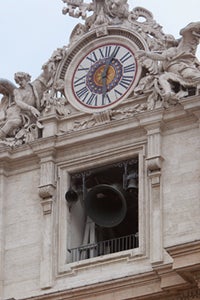Helping Catholic Parish Ministers unlock their ministry and defeat burnout forever. ❤️🔥
The Mass: A Model for Personal Prayer
 St. John of the Cross Statue by Magdeleine Weerts
St. John of the Cross Statue by Magdeleine Weerts
What should the rhythm of our personal prayer look like? Is prayer just one action, or a movement toward God with a beginning, middle, and end? The Church gives us an answer in the Catechism of the Catholic Church. This rhythm is akin to the Mass and can help us enter into prayer more easily and develop a habit of prayer that moves us towards God.
Personal Prayer and the Mass
If we look in the fourth pillar of the Catechism on prayer (remember, the Catechism is split into four pillars - Creed, Sacraments, Morality, and Prayer) especially the section on contemplative prayer, the Catechism makes the connection between contemplative prayer and the Mass:
"Entering into contemplative prayer is like entering into the Eucharistic liturgy" (paragraph 2711).

Remember, contemplative prayer is not something only reserved for Nuns or levitating Saints, contemplative prayer is nothing more than "a close sharing between friends" and "a gaze of faith, fixed on Jesus" meant for every Christian.
As we'll see in the Catechism, there are four movements to this rhythm of prayer: GATHER, RECOLLECT, ABIDE, ENTER.
Let's unpack the rest of paragraph 2711 to find a rhythm of personal prayer and its connections to the Holy Sacrifice of the Mass.
GATHER

"Entering into contemplative prayer is like entering into the Eucharistic liturgy: we "gather up" the heart, recollect our whole being under the prompting of the Holy Spirit, abide in the dwelling place of the Lord which we are, awaken our faith in order to enter into the presence of him who awaits us." CCC 2711 __________________________________________________________________________
At the beginning of Mass, we begin with the sign of the Cross and with an opening prayer, called the Collect. Thus the beginning of Mass is a call to gather ourselves up from the world and reorientate ourselves in relation to Christ.
When I first walk into Mass, there are a thousand thoughts and distractions going through my head, as when I first begin to pray. At the beginning of prayer and the Mass, the first step is gathering our attention and thoughts and disengaging from the world around us (like Kevin Costner in that baseball movie...) so that we can place ourselves in the presence of God. Making the Sign of the Cross is a good way to begin prayer because it reminds us why we pray and to whom we pray.
St. Francis de Sales offers four ways of disengaging from the world and placing ourselves in the presence of God in the Introduction to the Devout Life:
1) Realizing God is omnipresent; that God is in everything and everywhere 2) Realizing God is in a very special manner in your heart and the depth of your spirit 3) Realizing God looks down on us from heaven, especially those in prayer 4) Imagining Jesus Christ in his humanity as though he were near us or next to us
RECOLLECT

"Entering into contemplative prayer is like entering into the Eucharistic liturgy: we "gather up" the heart, recollect our whole being under the prompting of the Holy Spirit, abide in the dwelling place of the Lord which we are, awaken our faith in order to enter into the presence of him who awaits us." CCC 2711 _________________________________________________________________________
At the beginning of Mass after the opening prayer is the Penitential Rite, where we acknowledge our sins and repent of them, followed by the Gloria praising God for his mercy and love.
Likewise the next phase of prayer means being honest with ourselves and with God about the state of our our soul and our heart. "We do not know how to pray as we ought" (Romans 8:26), but if we ask, the Holy Spirit teaches and guides us in prayer to acknowledge and relate to God truthfully who we are, where we have been, our thoughts, desires, baggage, and even our recent sins and shortcomings.
A few paragraphs back, the Catechism explains contemplative prayer in the words of St. Teresa: "Conteplative prayer in my opinion is nothing else than a close sharing between friends" (Catechism 2709). It's like answering the question "How ya' doing?" from a friend you haven't seen in awhile.
ABIDE

"Entering into contemplative prayer is like entering into the Eucharistic liturgy: we "gather up" the heart, recollect our whole being under the prompting of the Holy Spirit, abide in the dwelling place of the Lord which we are, awaken our faith in order to enter into the presence of him who awaits us." CCC 2711 __________________________________________________________________________
During Mass, we abide in the presence of God and listen to Him. We hear His voice in the Old Testament, His glory in the Psalms, and encounter Him in the flesh in the Gospels, all during the Liturgy of the Word.
After coming to God in prayer and talking to Him about what is honestly going on in our heart and in our lives, the conversation begins to turn over to God. Just like on the road to Emmaus (Luke 24:13-35), after we unload what is on our hearts we give God the opportunity to respond to us. This is when true contemplative prayer can begin.
In the following paragraphs of the Catechism, it explains that "contemplative prayer is hearing the Word of God." (Catechism 2716) In order for us to hear the Lord, we need to be patient and wait on Him (Psalm 27:14). I can't stress enough how important interior silence is for prayer. How can we hear God speak to us if we never shut up? Don't be afraid that you are doing nothing by sitting in silence this way. "Contemplation is a gaze of faith, fixed on Jesus." (Catechism 2715). As long as you are focused on God, you are praying. Sometimes God speaks words to your heart, sometimes He sends you peace, sometimes He may just be present with you in that moment, pouring out His love on you.
ENTER

"Entering into contemplative prayer is like entering into the Eucharistic liturgy: we "gather up" the heart, recollect our whole being under the prompting of the Holy Spirit, abide in the dwelling place of the Lord which we are, awaken our faith in order to enter into the presence of him who awaits us." CCC 2711 __________________________________________________________________________
The most intimate moment of Mass happens when we receive our Lord in the Eucharist and come into communion with our God.
Contemplative prayer is a gift beyond words. Initiated by God, we become caught up in the life of the Trinity and are led to share in the love between the Father and the Son. There is no way to make this happen, we must abide in God's presence and wait for Him to bring us into communion with Him. But when this gift does occur, when God allows us to enter into His mystery and experience a foretaste of heaven, it is like an blaze of faith, hope, and love being ignited in your chest!
It's That Easy! (Sort of)
Prayer is hard work, especially contemplative prayer. Remember, God is the one who initiates contemplative prayer, it is a gift and we can only patiently wait with a loving gaze fixed on Him. Realize that it will be hard at the beginning, but if we put in even the smallest effort to reach out to God in love, God graciously reward us. Set up a time to regularly practice praying in this way everyday and you will begin to experience the deep love, joy, and peace of a life in intimate relationship with God.
A Rhythm of Prayer from Catechism 2711 "Entering into contemplative prayer is like entering into the Eucharistic liturgy: we "GATHER up" the heart, RECOLLECT our whole being under the prompting of the Holy Spirit, ABIDE in the dwelling place of the Lord which we are, awaken our faith in order to ENTER into the presence of him who awaits us. We let our masks fall and turn our hearts back to the Lord who loves us, so as to hand ourselves over to him as an offering to be purified and transformed."
+JMJ
###What do you think? Was this helpful? Let me know in the comment box. God Bless!
New Evangelization Must Be Cheese
 The New Evangelization has been called many things, but cheesy is not one of them, and this is a shame. If the New Evangelization is to accomplish the task of re-evangelizing the cultures and communities of today, then the New Evangelization should be more like good cheese.
The New Evangelization has been called many things, but cheesy is not one of them, and this is a shame. If the New Evangelization is to accomplish the task of re-evangelizing the cultures and communities of today, then the New Evangelization should be more like good cheese.
“In each inn the cheese was good; and in each inn it was different.”
G.K. Chesterton wrote some interesting things about cheese after a trip giving lectures around England. During his travels he lunched in several roadside inns across England that offered nothing but bread and cheese. He found in these cheeses a quality he describes as “the very soul of song.”
Chesterton saw in the cheeses two things:
1) Each cheese was local and therefore diverse, taking on the flavor of the surrounding culture.
The “noble” cheese of Wensleydale was a different happy expression of cheese than that of the cheese of Cheshire, or the cheese in Yorkshire, or the cheese in any of the inns. Chesterton believes that universal truths are best expressed through customs and civilizations when they are living, varying, and diverse. The cheese becomes exquisite because it communicates truth and beauty in a way that is in touch with reality and its local surroundings. The divine and universal idea of cheese takes on the human nature of the town and the people that labored to lovingly produce the cheese.
“Bad customs are universal and rigid, like modern militarism. Good customs are universal and varied, like native chivalry and self-defence… But a good civilization spreads over us freely like a tree, varying and yielding because it is alive. A bad civilization stands up and sticks out above us like an umbrella - artificial, mathematical in shape; not merely universal, but uniform.”
2) Each cheese was the object of a loving art, and therefore was very high quality.
"Now, it is just here that true poetic civilization differs from that paltry and mechanical civilization that holds us all in bondage." Chesterton noticed that industrial cheese found in a large city, much like soap that is mass produced and sent all around the world, did not have the same eclectic and local flavors of the cheese he encountered at the inns and was not very good either.
 Not only did the cheeses of the city lack an exquisite taste, but the people that served the city cheese took no pride nor showed any reverence toward their cheese. Chesterton laments about a waiter that served him cheese on what was basically a cracker. After dining on the magnificent cheese of the inns served with what most likely was hearty breads, Chesterton was more than a little upset to get a bland cheese on a lifeless cracker.
Not only did the cheeses of the city lack an exquisite taste, but the people that served the city cheese took no pride nor showed any reverence toward their cheese. Chesterton laments about a waiter that served him cheese on what was basically a cracker. After dining on the magnificent cheese of the inns served with what most likely was hearty breads, Chesterton was more than a little upset to get a bland cheese on a lifeless cracker.
“I addressed the waiter in warm and moving terms… I asked him if, when he said his prayers, he was so supercilious as to pray for his daily biscuits. He gave me generally to understand that he was only obeying a custom of Modern Society. I have therefore resolved to raise my voice, not against the waiter, but against Modern Society, for this huge and unparalleled modern wrong.”
 Industrialized Ministry
Industrialized Ministry
For too long we have been searching for an answer to the task of evangelization that is more like a microwave dinner than well made cheese. We want to take it out of the box, plug it into the parish, let it run, and reap the rewards of a vibrant ministry. We want a one-size-fits-all answer to evangelization that requires little thinking, no volunteers, and little effort.
There is a place for these resources, and they are a gift to the Church, but they should not be used as crutches or be the primary thrust of a parish's evangelization efforts.
Good Old New Evangelization Cheese
1.) Evangelization should be local and therefore diverse, taking on the flavor of the surrounding culture.
Christ was one man, and yet he finds infinitely varied and true expressions in the lives of the Saints. From the poor St. Francis to the richer St. Thomas Moore. From the silent and anonymous Benedictines hidden from the world in monasteries, to the preaching Domincans.
People want to encounter a living and active faith, not one that is recorded on dvd's and mass produced somewhere in Spain and shipped all over the world. These resources are great to supplement a parish, but they should not be the sole expression of a living and evangelizing culture of a parish.

We need to make each of our Churches a Saint. Our parish community should become a unique expression of Jesus Christ lived out in a life-giving and profoundly beautiful way. Our individual parishes need to engage and transform the surrounding culture into something sacred, something worth attracting the attention of modern man who is so jaded by industrialized, commercialized, and mass produced ideas.
Where have all the local celebrations and popular devotions gone? Most parishes are named after a Saint, but that is as far as the Saint's influence goes. Where is the loving expression of unique devotion? We have lost our culture, we have begun to mass produce our cheese. Where is the St. Francis Parish making fools for Christ? Where is St. Joseph's Parish devoted to producing holy fathers? Where is St. Stephen's Parish celebrating martyrs all year long and lighting a fire of zeal in its parishoners who would rather be stoned than betray their Lord?

What happened to Corpus Christi processions at Corpus Christi parishes? Why doesn't the Church in the country become the greenhouse of holy farmers? Why doesn't the Church in the city produce another Mother Teresa? Do you have a lot of doctors and nurses in the area? Why not start traditions and devotions to St. Gianna?
How often do we address the unique needs and capacities of our community members before trying to figure out how to minister to them? Do we send out surveys asking what they desire to learn more about, or what questions or problems the parish as a whole are facing?
2.) Evangelization should be the object of a loving art, and therefore high quality.
If we have the boldness to believe that we are involved in the sacred and holy task of transmitting Christ to others, we need to really reevaluate how we are accomplishing this. Do not make bad cheese, and do not serve Christ up on a cracker.
We need to have a more profound and deep reverence for what it is we are doing when we attempt to evangelize. Jesus Christ deserves much more than a clip art presentation thrown together at the back of the social hall.

We need authentic and beautiful culture. Why not encourage local art at our parish? Why not devote time and energy into fostering local spirituality: a spirituality of the fields, of the hills, of the city, of the farmer, of the rich, of the poor, of the community in your specific area that is more than just a thrown together prayer service, but is the work of a loving art?
The methods and modes we use to evangelize should be crafted and perfected - the object of a loving art. The way we speak, write, and advertise should all be approached with a awed humility. We are announcing the Most High, we should remember that we share this task with angels.
Prudence and Zeal
I won’t shy away from saying these things, even though some will read this and think “Yes, we need banjos in Mass and a kid with a streamer to dance during Father’s homily, and clowns, lots of clowns!” I am not advocating for the type of unique expression that is a mutilation of the truths of the faith. Zeal for authenticity and vibrancy must not mean the sacrifice of orthodoxy and universality.
I will leave you with the cheesy words of the Church:
From the Conclusion of the recent Synod on the New Evangelization
No one person or group in the Church has exclusive right to the work of evangelization. It is the work of ecclesial communities as such, where one has access to all the means for encountering Jesus: the Word, the sacraments, fraternal communion, charitable service, mission.
In this perspective, the role of the parish emerges above all as the presence of the Church where men and women live, “the village fountain”, as John XXIII loved to call it, from which all can drink, finding in it the freshness of the Gospel. It cannot be abandoned, even though changes can require of it either to be made up of small Christian communities or to forge bonds of collaboration within larger pastoral contexts. We exhort our parishes to join the new forms of mission required by the new evangelization to the traditional pastoral care of God's people. These must also permeate the various important expressions of popular piety.
40. The obvious importance of the content of evangelization must not overshadow the importance of the ways and means. This question of "how to evangelize" is permanently relevant, because the methods of evangelizing vary according to the different circumstances of time, place and culture, and because they thereby present a certain challenge to our capacity for discovery and adaptation.
63. The question is undoubtedly a delicate one. Evangelization loses much of its force and effectiveness if it does not take into consideration the actual people to whom it is addresses, if it does not use their language, their signs and symbols, if it does not answer the questions they ask, and if it does not have an impact on their concrete life. But on the other hand, evangelization risks losing its power and disappearing altogether if one empties or adulterates its content under the pretext of translating it
+JMJ
Does Jesus Hate Tattoos?
 Check out this great article on tattoo taboos, Leviticus, and the tattoo on Jesus' thigh by the world renowned Nate Addington.
Check out this great article on tattoo taboos, Leviticus, and the tattoo on Jesus' thigh by the world renowned Nate Addington.
"Every so often someone, usually of the elderly female variety, will raise one of three standard objections to tattoos.
1.) Someday you are going to regret that
2.) When you are old those are going to look horrible
and of course
3.) You know God does not like tattoos, it just isn’t Christian.
To which I always respond that I have never regretted, even for a fraction of a millisecond, any of my tattoos. Furthermore, when I am old and orchestrating wheelchair street races in the local nursing home, me and all my geriatric buddies will stretch out our wrinkled skin, take a shot of our prune juice, and share the stories of our tattoos while reminiscing about the good ole’ days when we were young and gas was only $4.00 a gallon."
Imitate Christ: Love Requires Us to Take Blows [Guest Post]
 What does Jesus' scourging, an old married Rabbi, and dragons have to do with relationships and marriage?
This week I had the great privilege of writing for Arleen Spenceley's series "Relationship Tips". Go give it a gander and be sure to check out some of Arleen's writings too, they are well worth your time.
What does Jesus' scourging, an old married Rabbi, and dragons have to do with relationships and marriage?
This week I had the great privilege of writing for Arleen Spenceley's series "Relationship Tips". Go give it a gander and be sure to check out some of Arleen's writings too, they are well worth your time.
"The only sword heavy enough to slay the dragon is the same sword Jesus used to defeat the soldiers that scourged him - total selfless love. Just as selfless love led Jesus to the pillar he was scourged on to defeat sin, and the cross on which he trampled death. In this sign, you too shall conquer.
Learn from Christ. The fallen imperfections of your lover are the saving scourges of your marriage. Only by enduring them with charity, humility, and patience will you win your bride, and at the same time yourself, from the clutches of the enemy. Defeat your lover’s dragons, so you can present him/her “without spot or wrinkle…that she might be holy and without blemish.” (Ephesians 5:27)"
You can find the full article here.
God bless your holy marriages and relationships! +JMJ
His Fingers Chewed, Cut, and Burned Off

Feast of St. Isaac Jogues and Companions
October 19th is the Feast day of St. Isaac Jogues and his companions. St. Isaac was a French Jesuit missionary to the Huron Indians in Canada who died a martyr in 1646 and helped thousands of Indians to convert to the faith in his lifetime.
He ministered to the Huron Indians from 1636 to 1642, when he was captured by the Iroquois Indians. St. Isaac and other Frenchman were imprisoned and tortured, St. Isaac had several of his fingers bitten off, burned, or severed. Even though he was severely mistreated, he urged the others held captive with him to forgive their captors and to offer their sufferings up to God for them.
St. Isaac was rescued and returned to France in 1643, where he was given a special dispensation to celebrate Mass with so few fingers. The following year he willingly went back to minister to the very Indians who tortured him.
After two years ministering to his persecutors, he was captured by the Mohawk Indians who killed him with a tomahawk.
St. Isaac and his companions, "The North American Martyrs," are honored as Saints, missionaries, and examples of total loving sacrifice, even for your enemies.
Letter from a Willing Martyr
Here is a heart wrenching excerpt of one of St. Isaac Jogues' letters to a Priest friend before St. Isaac made his last journey where he was captured and martyred.
. . . <The Iroquois have come to make some presents to our governor>, ransom some prisoners he held, and treat of peace with him in the name of the whole country. It has been concluded, to the great joy of France. It will last as long as pleases the Almighty.
To maintain, and see what can be done for the instruction of these tribes, it is here deemed expedient to send them some father. I have reason to think I shall be sent, since I have some knowledge of the language and country. You see what need I have of the powerful aid of prayers while amidst these savages. I will have to remain among them, almost without liberty to pray, without Mass, without Sacraments, and be responsible for every accident among the Iroquois, French, Algonquins, and others. But what shall I say? My hope is in God, who needs not us to accomplish his designs. We must endeavor to be faithful to Him and not spoil His work by our shortcomings....
My heart tells me that if I have the happiness of being employed in this mission, <Ibo et non redibo> (I shall go and shall not return); but I shall be happy if our Lord will complete the sacrifice where He has begun it, and make the little blood I have shed in that land the earnest of what I would give from every vein of my body and my heart.
In a word, this people is "a bloody spouse" to me (Exodus iv, 25). May our good Master, who has purchased them in His blood, open to them the door of His Gospel, as well as to the four allied nations near them.
Adieu, dear Father. Pray Him to unite me inseparably to Him.
Isaac Jogues, S.J.
Jesus, our Brother, you won the heart of St. Isaac Jogues and helped him grow as a caring, courageous person. He dedicated his life to sharing his love for you by carrying the Good News about your love for all people to others.
Remembering the spirit of St. Isaac Jogues, may we all grow in caring and courage. Help each of us, Jesus, to be strong and gentle messengers of your love. Amen.
St. Isaac Jogues and Companions, Pray for us!
God and Dice
 This is not how you use dice.
You roll dice.
This is not how you use dice.
You roll dice.
In games with dice, the dice and chance are the masters of the outcome. We become willingly dependent upon them to tell us the fate of our turn with a roll. In a way, this is part of the fun of games of chance.
Where is this kind of dependence on God in our own lives?
How often are you letting God determine the outcome? In your [insert project/endeavor/road trip/dating life/career/family/troubles/etc here] how much room are you giving the Holy Spirit to inspire and move? How much room are you giving God to create and guide?
How often do you say “God, I’m trusting you to work this out.” Or “God, this is less planned out than I want it to be, but I have faith in your Divine Providence.”
We have a natural desire to control every particular aspect of our lives. We have 100 television channels so we can control what we watch. We have access on itunes or youtube to virtually every recorded song there is. We control who we see on Facebook and Twitter, and who we don’t. We can control the temperature in our house, what we want on our burger, and what colors are shoes are.
But if we try to control every little detail, what’s left for God to control?
The interesting thing about dice is that if you want to use them properly, you have to let go of them. You have to drop the dice. You could map out every possible outcome and draft the perfect strategy and try to use math to gain an advantage. But you eventually have to drop the dice and see what comes up.
Dice are stupid. Neither chance nor dice care about you. But God cares about you.
Radical dependence on God is not dice rolling. There is a person involved (three to be exact) and He is giving you the numbers — not always the ones you want but exactly the ones you need. In fact, He often gives you numbers you never would have thought of. Let’s start depending, DEPENDING, on God’s grace. Depending on God means risking failure.
Depending does not mean just thanking God in retrospect if your plans work out. Don’t be a prophet who only talks about the past. That’s safe. Don’t be an Apostle who never speaks “Rise!” to the cripple. That’s safe. Don’t be David and never whip a stone toward the giant. That’s safe. Don’t be a Catholic who never leaves room for God’s providence to map out the journey.
Drop the dice.
+JMJ
(Originally published at IgnitumToday)
Love Like the Movies
[youtube=http://youtu.be/KABO3F9IfEw] Why do we love movie romances so much, and why do we desire for the love stories in movies to happen to us? Really, why do all of us want to be in love like the movies?
I was blessed to have the opportunity to write a guest post for Ignitum Today.
Check out the full article here: http://www.ignitumtoday.com/2012/09/25/love-like-the-movies/
Be a Saint!
+JMJ
Free Book Giveaway & Support a Catholic Speaker Month
 It's September and you may not know it's also Support a Catholic Speaker Month. I'm giving away a free book (see end of post) by Blessed Pope John Paul II to help raise some support for Deacon Ralph Poyo, who I had the pleasure of video interviewing and writing an article about.
It's September and you may not know it's also Support a Catholic Speaker Month. I'm giving away a free book (see end of post) by Blessed Pope John Paul II to help raise some support for Deacon Ralph Poyo, who I had the pleasure of video interviewing and writing an article about.
Being a Catholic speaker is hard work. They travel away from family for many days out of the year, giving all the energy and passion they have to a large group of people for sometimes hours on end, and don't always get the best pay or sometimes rely solely on the grace of God to provide them and their families with support.
Today's First Reading starts with St. Paul urging us to live a life worthy of the call we have received. He then goes on to talk about the many and varied calls given to us as followers of Christ:
But grace was given to each of us according to the measure of Christ's gift. And he gave some as Apostles, others as prophets, others as evangelists, others as pastors and teachers, to equip the holy ones for the work of ministry, for building up the Body of Christ, until we all attain to the unity of faith and knowledge of the Son of God, to mature manhood, to the extent of the full stature of Christ. Ephesians 4:11-13
Being a Catholic speaker is a call from Christ to serve and build up the Body of Christ, the Church, in a specific way. The Church needs good public speakers to build us up, convict us, empower us, and to evangelize us.
The purpose of Support a Catholic Speaker Month is to give us a chance to give back to the speakers who have given so much to us by supporting and encouraging them as gifts to the Body of Christ.
I believe this is so important and I want to try to reward you for spreading prayers, love and support for the great Catholic speaker I had the honor of interviewing for this month, Deacon Ralph Poyo.
Deacon Ralph's speaking ministry is a passionate and spirit filled gift to the Church (if you don't know much about him, check out the video interview and blog post here), and there are some Churches and some Catholics who need to hear him speak, but have never even heard of him. (Check out the bottom of the post interview for some amazing examples of him speaking)
Help me spread the word about his speaking ministry and support him with prayer.
Here are two things you can do right now to support Deacon Ralph:
1) Pray for him, his family, and the call he is living out. It would only take a few seconds to send a Hail Mary his way. Maybe offer him up in your intentions at Mass. Say a Rosary for him. Comment below what you have offered up in support and we can start a spiritual bouquet for him and his ministry.
2) Share the post and video interview on the interwebs The post and interview can be found here. Facebook, twitter, email - however you can spread the word helps Deacon Ralph get to a parish that God wants to send him to minister at.
I am giving away a free Catholic book by Blessed Pope John Paul II, and you can enter for a chance to win it by commenting below on this post (or this post) and saying whether you shared the interview with Deacon Ralph on Facebook or twitter, or said a prayer for him and his ministry. The opportunity to enter ends October 1st, when I will pick and announce a random winner, contact them, and send them "Crossing the Threshold of Hope" by Blessed Pope John Paul II, free of charge.
Thanks in advance for your charity and support!
+JMJ Edmund
Catholic Book Giveaway to Support Deacon Ralph!
You can find the full post with the video interview and Book Giveaway >>>here<<<
Catholic? Where's the evidence?
[youtube http://www.youtube.com/watch?v=oPHe51B7Z00&w=560&h=315] "You may say you're a Catholic but....there's no proof!"
What makes you Catholic? The clothes or jewelry you wear? Going to Mass on Sundays? Being raised a Catholic? If you were put on trial for your faith, would there be enough evidence to convict you of being a Catholic? This chilling video, written by Bob Rice and produced by Outside da Box, challenges you to think about what really makes you a Catholic.
"Not everyone who says to me 'Lord, Lord' will enter the Kingdom of Heaven, but Him who does the will of my Father who is in heaven." Matthew 7:21
Right now Americans are getting mixed signals about what exactly Catholics believe. Faithful Catholics are fighting a battle to faithfully live out what the Church believes, while many who call themselves "Catholic" are living in opposition to the Gospel and the Church's teachings. We need to challenge our brothers and sisters.
####Let's flood the internet with this video. Facebook post it on your friends' wall, tweet it on Twitter, email it to everyone you know, or write the video URL in marker on your forehead. (If you do that last one, please send me a picture...)
Comment below and let me know how many places you posted the video, so I can give you a virtual high-five.
+JMJ
####Don't forget to subscribe so ya don't ever miss any Catholic goodness from this blog! Do it here!





